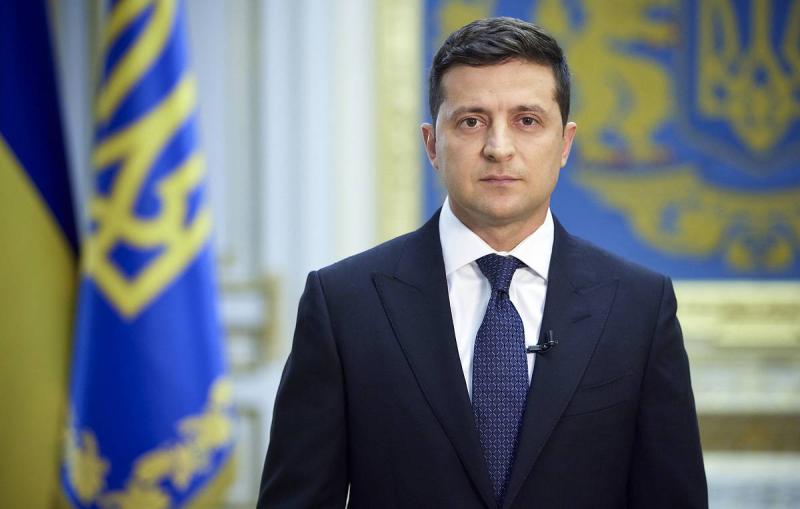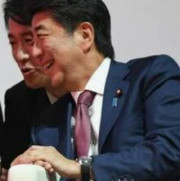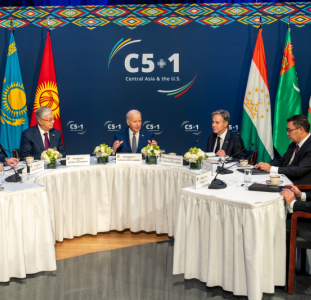
© Ukrainian Presidential Press Office via AP/TASS
According to the Kiel Institute for the World Economy, public commitment of Western countries to Ukraine (i.e. assistance provided and pledged) amounted to $126 billion as of early October, including $55.3 billion from the USA (43.9%), $40.6 billion from the EU (32.2%), $10.9 billion from international organizations (8.7%), $7.4 billion from the UK (5.9%), and $12.2 billion other countries (9.3%). This amount is nearly Ukraine's 2022 GDP estimated at $130 billion by the IMF, while outpacing its budget revenues by a large margin. In fact, Ukraine is fully maintained by countries and organizations listed above.
Kiev hopes to keep it that way. On September 13, Ukrainian government approved the draft state budget for 2023, with a deficit envisaged at 20% of GDP. The country's Prime Minister Denis Shmygal noted that the monthly budget deficit is estimated at $3 billion, which Ukraine intends to close with external borrowing. In an interview with German media, he said "Ukraine may not have the money to pay wages and pensions unless the European Union speeds up its financial aid. Brussels should act quickly to transfer all of the €9 billion ($8.8 billion) that was pledged to Kiev in May. We need it so that our financial system can survive." In quest for money, Ukraine feels free to blackmail Europe. In an interview with the Frankfurter Allgemeine Zeitung on October 22, Shmygal said "if there is no electricity, heating or water in Ukraine, a new migration tsunami may sweep through Europe."
The Ukrainian authorities use the slightest pretext to get as much money as possible from the United States, the EU and other countries. Their task is to make the most of them, no matter what the money goes to. Today, they work the bugs out of the power system collapse, constantly overestimating the extent of damages in order to sting more.
Ukrainian leaders do not care whether they get this money in the form of a loan or a grant, having no plans to repay the debts. They simply want more and more and more. Thus, October saw President Zelensky put forward another demand. Speaking via video link to the G7 finance ministers, he said Ukraine needs $55 billion to cover the budget next year, and another $17 billion to restore the critical infrastructure. He has nothing to repay with, as his country’s industry is destroyed, and the land is mortgaged or sold.
Naked people on the bare ground searching for and living by alms – this is what awaits Ukraine. And chances are high that however much money it gets, the ultimate consumer will miss it, with regime leaders fattening their wallets instead. This is just "traditional" business to them.
Mounting needs of the Kiev regime cause scathing criticism with the United States. Well-known Fox News host Tucker Carlson recently called Zelensky an "uppity foreigner in a T-shirt", lambasting him for claiming Western money. And Washington will likely support Kiev to the same extent under the current administration and Congress alone. Following the November midterms, things may change radically. The Republican House leader Kevin McCarthy hypothesized a shrinkage of American aid to Ukraine. The United States is increasingly inclined to politically support the Zelensky regime, authorizing Europe for direct engagement functions in the conflict. At this juncture, the money given short by the Americans will put a strain on the EU.
And EU officials seem to be OK with saddling the population of Europe with this unpleasant task. After the EU summit in Brussels, head of the European Council Charles Michel said his entity would keep aiding Ukraine. And according to head of the EC Ursula von der Leyen, Ukraine has informed the EU of seeking to get a monthly 3 to 4 billion euros, part of which (1.5 billion euros) the latter is ready to provide. In October, EU foreign ministers agreed to allocate assistance worth 500 million euros for Kiev’s military training mission. Besides, the European Union will provide Ukraine with an emergency one billion euros for urgent energy supply restoration.
They are echoed by the German leadership, with Foreign Minister Anna Lena Baerbock and Defense Minister Kristine Lambrecht moving for weapons supplies to Ukraine worth 2.2 billion euros. This amount, as noted by Spiegel, is 1.5 billion euros more than provided for in the budget (some 700 million euros). Baerbock and Lambrecht are sure this will help Germany make it clear that it won’t hesitate to assume responsibility its international partners expect.
Will Europe withstand this additional burden? After all, this entire luminous feat of generosity is taking place amid the European Union’s rampant energy crisis and deeper recession. It is getting too heavy a burden on Europeans, from tolerating Ukrainian disrespect to satisfying the Kiev regime’s growing assertiveness.
Europe is getting sick and tired of Zelensky’s endless demands. The rhetoric is changing in the media, with political statements becoming an increasingly frequent thing. Thus, intentions of the EC head were slammed by leader of France’s The Patriots Florian Philippot. "Ursula is going crazy! Lock her up! 1.5 billion a month for Zelensky’s Ukraine or 18 billion a year. And all this time, the continent will live in conditions of scarcity, unemployment and rationing!", he wrote on Twitter.
Former French President Nicolas Sarkozy is at one with him, saying the EU was dancing on the edge of a volcano because of the EC policy, which only continues to increase arms supplies to Ukraine, while ignoring the problems of its own citizens… "The European Commission is an administrative structure. I just cannot understand which article of European agreements empowers Ursula von der Leyen to set up as an expert in arms procurement and foreign policy," Sarkozy said. According to him, the only thing the Europeans hear is "new billions for arms purchases." "More weapons, more deaths, more war!" he said, sure that France should lead the way as regards resolving the Ukrainian crisis.
Courtesy of pro-American European officials, backing pro-Ukrainian policy falls on the shoulders of ordinary people. And the upcoming winter frosts may cause their backs and nerves fail to bear it any longer.









